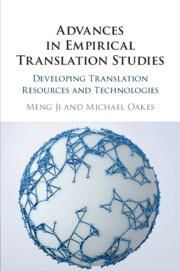Book contents
- Advances in Empirical Translation Studies
- Advances in Empirical Translation Studies
- Copyright page
- Contents
- Figures
- Tables
- Contributors
- Preface
- 1 Advances in Empirical Translation Studies
- 2 Development of Empirical Multilingual Analytical Instruments
- 3 Statistics for Corpus-Based and Corpus-Driven Approaches to Empirical Translation Studies
- 4 The Evolving Treatment of Semantics in Machine Translation
- 5 Translating and Disseminating World Health Organization Drinking-Water-Quality Guidelines in Japan
- 6 Developing Multilingual Automatic Semantic Annotation Systems
- 7 Leveraging Large Corpora for Translation Using Sketch Engine
- 8 Developing Computerised Health Translation Readability Evaluation Tools
- 9 Reordering Techniques in Japanese and English Machine Translation
- 10 Audiovisual Translation in Mercurial Mediascapes
- 11 Exploiting Data-Driven Hybrid Approaches to Translation in the EXPERT Project
- 12 Advances in Speech-to-Speech Translation Technologies
- 13 Challenges and Opportunities of Empirical Translation Studies
- Index
- References
2 - Development of Empirical Multilingual Analytical Instruments
Published online by Cambridge University Press: 10 June 2019
- Advances in Empirical Translation Studies
- Advances in Empirical Translation Studies
- Copyright page
- Contents
- Figures
- Tables
- Contributors
- Preface
- 1 Advances in Empirical Translation Studies
- 2 Development of Empirical Multilingual Analytical Instruments
- 3 Statistics for Corpus-Based and Corpus-Driven Approaches to Empirical Translation Studies
- 4 The Evolving Treatment of Semantics in Machine Translation
- 5 Translating and Disseminating World Health Organization Drinking-Water-Quality Guidelines in Japan
- 6 Developing Multilingual Automatic Semantic Annotation Systems
- 7 Leveraging Large Corpora for Translation Using Sketch Engine
- 8 Developing Computerised Health Translation Readability Evaluation Tools
- 9 Reordering Techniques in Japanese and English Machine Translation
- 10 Audiovisual Translation in Mercurial Mediascapes
- 11 Exploiting Data-Driven Hybrid Approaches to Translation in the EXPERT Project
- 12 Advances in Speech-to-Speech Translation Technologies
- 13 Challenges and Opportunities of Empirical Translation Studies
- Index
- References
Summary
This chapter introduces and illustrates the socially-oriented approach to empirical translation research which has been gaining momentum in recent years with the availability of large-scale multilingual and translational data bases and the advancement in corpus translation research methodologies. The proposed social turn aims to expand the current horizon of empirical translation research by developing and testing data-driven corpus analytical instruments to help address pressing social and research issues which have arisen from the increasing cross-cultural translation and communication of new social concepts, values and idea sets in more recent decades such as environmental protection and sustainable development. Discussions in this chapter draw upon the corpus-driven analysis of the translation, transmission and social communication of multilateral environmental agreements across a wide range of countries at different stages of economic and social development including developing and developed countries in Europe, East Asia, Asia-Pacific, Latin America and North America. The multilingual corpus analysis led to the development of a country-based ranking scheme to assess the level of multi-sectoral interaction within a country in terms of the communication of translated environmental management knowledge. This new ranking scheme was then compared with the widely endorsed global environmental performance index (EPI) and the strong alignment between the two ranking schemes verified the theoretical hypothesise that stronger multi-sectoral interaction at the national level can effectively enhance the overall environmental performance of a country.
Keywords
- Type
- Chapter
- Information
- Advances in Empirical Translation StudiesDeveloping Translation Resources and Technologies, pp. 13 - 27Publisher: Cambridge University PressPrint publication year: 2019

